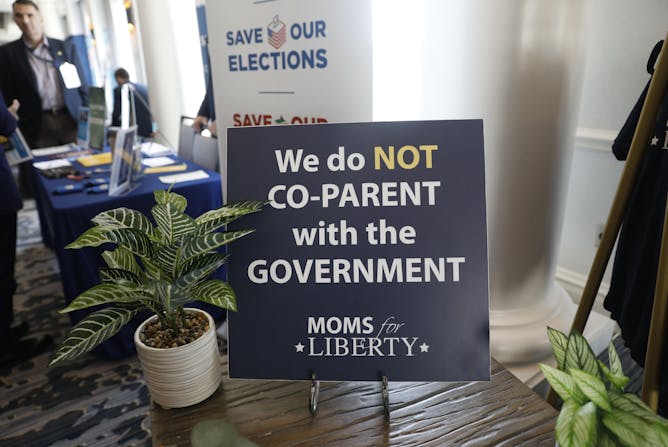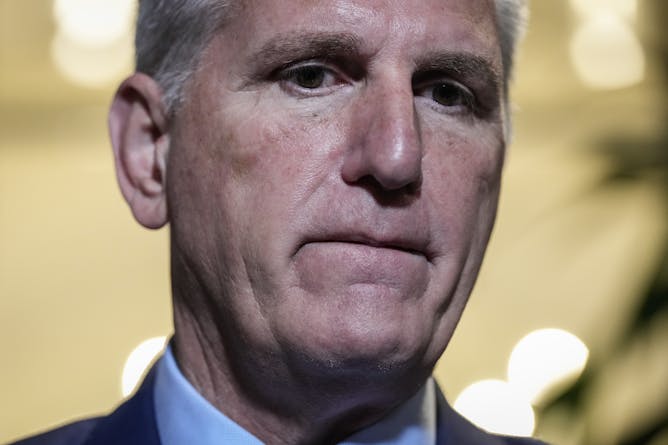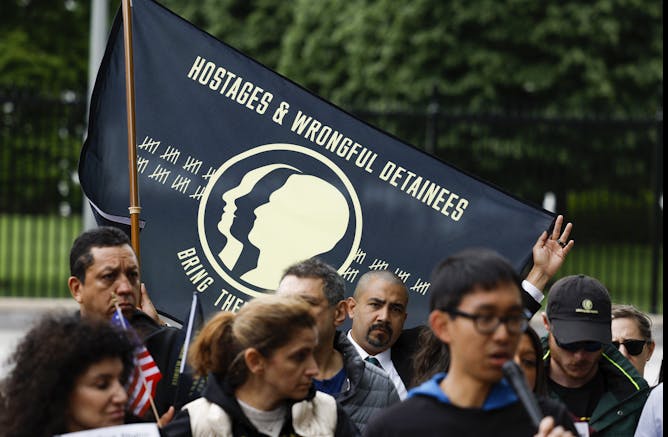|
|
|
|
Moms for Liberty, the 2-year-old conservative mothers political advocacy group, has been in the news a lot. That’s one of its skills, getting media attention.
The group says its mission is to “fight for the survival of America by unifying, educating and empowering parents to defend their parental rights at all levels of government.” Its members have been described as anti-government conspiracists by their critics.
Political scientist Shauna Shames writes that the group – which began its life advocating resistance to COVID-19 mask mandates – is part of a continuum in American politics: “Change the clothes and hairdos and these ladies could look like the conservative white women who opposed busing in 1970s Boston, supported McCarthy anti-communism or blocked integration in Southern schools.”
While they are an untested – and unrepresentative – group on the fringe of GOP politics, in today’s national political landscape, Moms for Liberty could wield significant political power. “Moms for Liberty, having organized small, ideological voting armies in swing states, is in the envious position of representing a concentrated and potentially decisive voting bloc,” writes Shames.
|

|
Naomi Schalit
Senior Editor, Politics + Democracy
|
|

Signs in the hallway during the inaugural Moms For Liberty Summit on July 15, 2022, in Tampa, Fla.
Octavio Jones/Getty Images
Shauna Shames, Rutgers University
Moms for Liberty, founded in 2021 and now boasting 120,000 members, could ride its conservative, limited-government message to a position of strong influence in the GOP.
|

House Speaker Kevin McCarthy.
Drew Angerer/Getty Images
Charles R. Hunt, Boise State University
An expert on Congress helps untangle the mess that is Kevin McCarthy’s life as speaker of the House right now.
|

Family members of American citizens detained overseas participate in a Bring Back our Families rally on May 3, 2023, in Washington.
Anna Moneymaker/via Getty Images
Klaus W. Larres, University of North Carolina at Chapel Hill
The hostage swap between the U.S. and Iran may be an important step in a new nuclear deal between the West and Iran.
|
|
|

Jennifer Wolak, Michigan State University
When politicians talk more about their personal lives and less about politics, it makes people from the opposing side of the political line see them as people and like them more.
| |

Matthew Valasik, University of Alabama; Shannon Reid, University of North Carolina – Charlotte
The Proud Boys are more of a loosely affiliated street gang than they are a unified right-wing militia, researchers say. But police ignore the threats from these groups, and their threats grow.
|

Char Newton, University of North Dakota
Whether experienced directly or indirectly, racial incidents can trigger numerous psychological impacts on Black people, including lower self-esteem and anxiety.
| |

Peter Dixon, Columbia University; Amy E Lerman, University of California, Berkeley; Fiorella Vera-Adrianzén, Santa Clara University; Naomi Levy, Santa Clara University
While Americans tend not to use the word “peace,” and instead opt for terms like “safety and security,” their desires and fears are not so different from what people in war-torn places express.
|
|
|
|
|
-
Mike Brand, University of Connecticut
The international community has also failed to protect civilians in Syria, South Sudan, the Democratic Republic of Congo, Yemen, Myanmar and Ethiopia, a genocide expert writes.
-
Mark Juergensmeyer, University of California, Santa Barbara
Canadian Prime Minister Justin Trudeau spoke of ‘credible allegations’ of Indian involvement in a Sikh leader’s death.
-
Sher Jan Ahmadzai, University of Nebraska Omaha
The Biden administration has not ruled out diplomatic recognition of the Taliban. Doing so risks legitimizing the group’s rule without holding it accountable.
-
Sian Mughan, Arizona State University; Akheil Singla, Arizona State University
Research shows police officers issue more traffic tickets and judges impose more fines when their city gets the money and when the budget is tight.
|
|
|
|
|
Like this newsletter? You might be interested in our other weekly emails:
|
| |
| |
| |
| |
|
|
|
|
|
|
|